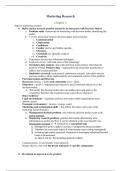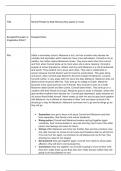Samenvatting
Samenvatting Marketing Research Malholtra EBB085A05
- Instelling
- Rijksuniversiteit Groningen (RuG)
- Boek
- Marketing Research
Samenvatting Marketing Research Malholtra EBB085A05 Malhotra, Naresh K., Marketing Research – An Applied Orientation, 7th global edition, Pearson, 2019. ISBN 978-1292265636. Lilien, Gary L., Rangaswamy, A., and De Bruyn, A., Principles of Marketing Engineering and Analytics, 3rd edition, Deci...
[Meer zien]







